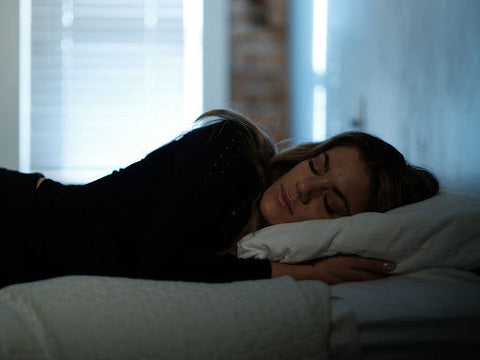Struggling to get a restful night’s sleep? You’re not alone. In fact, up to 70 million Americans grapple with chronic sleep issues, and a mere 20% of adults manage to sink into that coveted deep sleep each night.
While the age-old saying “I’ll sleep when I’m dead” makes light of (and often glorifies) sleepless nights, there are more serious health and even safety implications of low-quality sleep besides feeling groggy the next day. Whether it’s stress, sleep-disrupting lifestyle habits, or a medically-related sleep issue that’s keeping you up at night, adopting methods to help you fall, and stay asleep, is critical to your overall health and well-being.
If you’re here, you’re likely wondering: “Does the sauna help you sleep?” This article will explore the relationship between sauna and sleep that may help you finally catch those restful z’s.
Before we dive into the facts, let’s first take a look at the importance of consistent, quality sleep and the health consequences poor sleep can lead to.

The Importance of Quality Sleep
Sleep isn't merely a time for the body to rest—it's a cornerstone of overall health. Deep within our sleep cycles, deep, slow-wave sleep (stage 3) holds a unique significance.
Deep sleep is much more than just a downtime for the body and mind; it's pivotal for our physical and mental health. When you're in deep sleep, your body releases roughly 75% of your human growth hormones (HGH), which help restore the body in various ways. For instance, HGH release during deep sleep helps regulate metabolism and repair muscles, bones, and tissue. This phase of sleep bolsters our immune system, ensuring it functions optimally.
Beyond the physical benefits, deep sleep is a linchpin for cognitive function and memory consolidation. As you go about your day, your brain is flooded with information, strengthening synapses or communication points. However, our brains can't continually absorb this data without adequate rest. During deep sleep, our brains sift through these memories, solidifying only the most pertinent ones to prevent memory pathway saturation. This has been further observed when people, after learning a new task, showed higher slow-wave activity (indicative of deep sleep) in relevant brain areas.
How Poor Sleep Can Affect Your Health
Most adults require around seven hours of nightly sleep, with up to 20% of this being deep sleep. Normally, you'd enter deep sleep about an hour after dozing off and cycle through it in shorter durations as the night progresses. When we consistently miss out on the sleep our bodies and minds need, we risk entering the territory of chronic sleep deprivation.
Chronic sleep deprivation can lead to a host of health problems, ranging from a weakened immune system and cognitive function, to increased stress levels, heart disease, obesity, and depression. Chronic sleep deprivation can also accelerate the onset of neurological diseases like Alzheimer’s and Parkinson’s.
Factors that Disrupt Sleep
From the blue light of our devices to the stresses of daily life, there is an endless list of factors that can interfere with sleep. Consumption of caffeine or alcohol before bedtime, an inconsistent sleep schedule, and even the room's temperature can hinder our ability to drift off into a restful slumber.
While it’s important to address potential causes affecting your ability to fall asleep, it also helps to have tools at your disposal that can help you create a relaxing bedtime routine and help you fall asleep.
How Does Sauna Help You Sleep?
Beyond the strategies of sipping calming teas, tuning into binaural beats, and minimizing light and electronic use before bed, experts also advocate for deliberate heat exposure as a catalyst for a quality night’s sleep. Aside from taking a warm bath, indulging in a sauna session can be especially effective in the quest for better sleep. Let's dive into the four key benefits of using a sauna for sleep:
1. Regulate Body Temperature
Using a sauna for sleep can be seen as a way to reinforce the body's inherent mechanisms for initiating sleep.
Our body's internal clock, or circadian rhythm, governs numerous physiological processes, and one of the most evident is the daily pattern of rising and falling body temperature. This temperature fluctuation is intimately tied to our sleep-wake cycle.
In the late afternoon to early evening, our body temperature starts to drop, reaching its lowest point in the early hours of the morning. This decrease in body temperature, especially in the evening, signals the pineal gland in the brain to produce and release melatonin, a hormone that prompts feelings of sleepiness and regulates our sleep-wake cycle.
While melatonin is primarily produced in response to darkness (one reason it’s important to avoid light exposure at night), engaging in deliberate heat exposure activities, like sauna, can further promote the natural release of melatonin. Here’s how it works.
When you immerse yourself in the heat of a sauna, your body temperature rises. After leaving the sauna and allowing your body to cool down, there's a sharper and more significant drop in temperature. By mimicking and amplifying the natural temperature drop that occurs in the evening, a sauna session can prepare the body for restful sleep and may contribute to more consistent and rejuvenating nightly rest.
RELATED: Sauna for Stress Relief
2. Lower Cortisol
Stress, manifested through elevated cortisol levels, is one of the major culprits behind sleep disturbances. Cortisol is commonly referred to as the "stress hormone" because it's secreted at higher levels during the body's fight-or-flight response.
While cortisol is crucial in certain situations, chronic elevation, often due to long-term stress, can interfere with sleep. Elevated cortisol, especially in the evening, can delay the onset of sleep, decrease the amount of overall sleep, and reduce the quality of that sleep. A session in the sauna can help counteract this by lowering cortisol levels.
3. Release “Feel Good” Chemicals
You know that wave of relaxation and sense of euphoria you feel after a sauna session? It's no coincidence. Regular sauna use has been linked to an increased release feel-good chemicals—endorphins, serotonin, and dopamine—which act almost as sedatives, helping us feel calm and content.
These compounds also act as analgesics, which means they diminish the perception of pain. Based on the combined benefits of lowered cortisol levels and enhanced endorphin release, it’s safe to say the sauna is an effective tool to help unlock a better night’s sleep.
4. Increase Blood Flow to Muscles
If muscle soreness and discomfort are keeping you up at night, consider integrating sauna therapy into your routine. Beyond the analgesic effects of endorphins, the sauna's warmth increases blood flow to the muscles. This improved circulation not only helps in unwinding tense muscles but also delivers vital nutrients and oxygen to properly heal, reducing potential injury risks and paving the way for a good night's sleep.
This benefit isn't limited to just the major muscle groups, either. Even the tiniest muscles, which often get overlooked, experience therapeutic warmth. After a sauna session, you'll find yourself in a state of intense relaxation, primed for a deep and restful sleep.
Sauna Before Sleep: A Winning Strategy
Wondering if you should be hitting the sauna before sleep or earlier in the day? Most experts agree that utilizing a sauna in the hour(s) leading up to bedtime capitalizes on multiple physiological benefits that support the body's natural sleep mechanisms.
For example, the sauna-induced temperature rise, followed by the cooling-down phase, accentuates the body's natural evening temperature drop, prompting a more robust release of the sleep-regulating hormone, melatonin.
Additionally, the sauna's environment fosters relaxation, helping to diminish the day's residual stress. This relaxation is furthered biochemically by reduced cortisol levels and increased endorphins, priming the body and mind for sleep.
Lastly, the sauna’s heat therapy relaxes muscles, relieving tensions that might otherwise disrupt rest. Simply put: hitting the sauna before sleep rather than earlier in the day will give you the very best chance of catching restful z’s.
RELATED: Should You Sauna Before or After a Workout?

In Conclusion
With the modern challenges of sleep disruptions—from excessive screen time to caffeine intake—there's a need for effective interventions. Saunas fit this role by helping to reduce cortisol, elevate endorphins, and trigger melatonin release. These physiological changes, combined with pre-bedtime circadian-supporting practices such as dimming lights and avoiding stimulants, set the stage for deeper, more restful sleep.
Incorporating saunas into a holistic health routine, along with other sleep-positive habits, may not only deliver the relaxation you crave but also the restorative sleep you need to live a happier, healthier life.
Unlock Better Sleep with SweatTent
If you’re searching for a holistic tool to support your journey toward better sleep, look no further than SweatTent. As the most powerful, portable, and affordable home sauna tent available, SweatTent brings the classic Finnish sauna experience to your outdoor space, no matter the size. With its easy-up design and robust heating capabilities reaching 200°F of wood-fired heat in under 30 minutes, SweatTent’s portable sauna tent is the best tool to help you not only achieve better sleep but unlock total mind and body wellness.
For more insights on the various health benefits of saunas, along with expert-approved tips for a successful sweat, visit the blog. To see SweatTent in action, visit our Instagram (@sweattents), and share your moments with us using #sweattent!
Medical disclaimer: This post is intended for informational purposes only and is not a substitute for professional medical advice. Please consult with your doctor before adding sauna bathing to your health and wellness routine.








